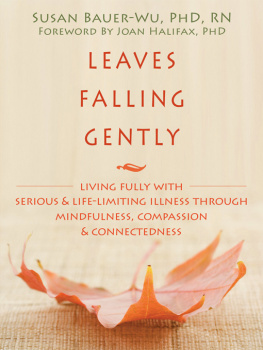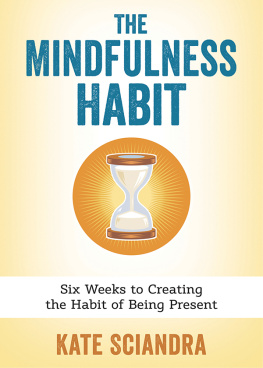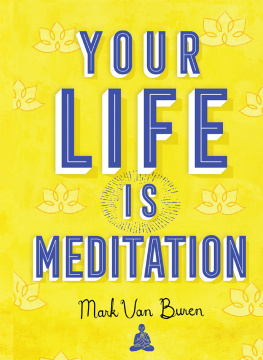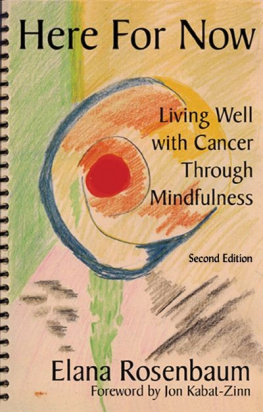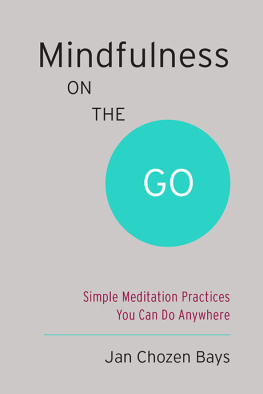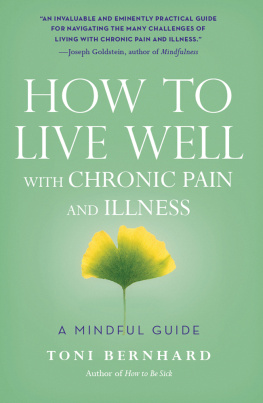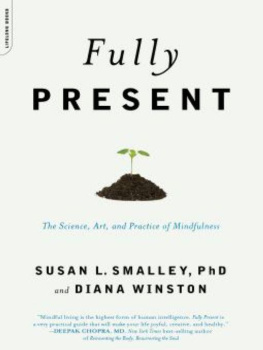Acknowledgments
This book is the culmination of decades of learning and growing through personal, professional, and academic experiences and remarkable people who have enriched my life along the way. While its not possible to recognize everyone whose fingerprints are on these pages, there are special individuals to whom I am especially indebted and whom I would like to gratefully acknowledge:
My parents, Florence and Bill Bauer, whose examples of love, generosity, and living with life-limiting illness provided the first seeds for this book.
The countless patients and families I have been privileged to walk alongside as they have faced the challenges of their medical conditions. I have been strengthened by our shared experiences, which inspire me to continue this meaningful work.
Those who read drafts of this book, whether sections or the entirety, and provided invaluable input and assistance: Melissa Blacker, for her clear and critical feedback with regard to language that most effectively conveys mindfulness; Angela Epshtein, for her keen and extraordinarily helpful editing suggestions; John Wu, my husband, for reading every word and sharing his sensitive insights and practical suggestions; and Rachael Whitworth, for her steady and kind presence and attention to detail.
The wonderful staff at New Harbinger, principally Angela Autry Gorden, Catharine Meyers, Jess Beebe, Kayla Sussell, and Melissa Valentine. Their guidance, input, and understanding were enormously helpful and made my first (nonacademic) book experience remarkably pleasurable.
Joan Halifax Roshi, a beloved friend and teacher. Her wise counsel, no-nonsense ways, and good humor motivate me to realize my potential and joyfully continue on the path of service.
The Upaya Institute and Zen Center Being with Dying faculty: Roshi Joan, Tony Back, Cynda Rushton, Gary Pasternak, Mary Taylor, and Donna Kwilosz. Our work together is nourishing and reinforces the value of contemplative practices and the power of compassionate silence.
Dan Siegel, for nudging me in just the right way, at just the right time, to get going on writing this book. His enthusiastic words opened the door within me to make it a reality.
My colleagues and students at Emory University in Atlanta, Georgia, where the collaborative spirit and stimulating learning and teaching environment continually energize me. I sincerely thank those with whom I work as part of the Nell Hodgson Woodruff School of Nursing, Emory Collaborative for Contemplative Studies, Emory-Tibet Science Initiative, and Winship Cancer Institute. A special thank-you goes to Larry Barsalou, John Dunne, and Stephanie Grossman for their valued friendship.
Jon Kabat-Zinn, Saki Santorelli, Melissa Blacker, and Florence Meleo-Meyer, for their vision and tireless efforts to establish and develop the University of Massachusetts Center for Mindfulness in Medicine, Health Care, and Society, and for their support and mentoring to me.
Treasured friends and colleagues who have helped to sustain me, undimmed by distance or circumstances: Katherine Brown-Saltzman and Janice Post-White for our biennial girls spa getaways (formerly writing retreats) and dancing with the dolphins in Hawaii; Mary Cooley for being such a dear and impeccable collaborator; Adam Engle for sticking by me on the trail (even at eighteen thousand feet); Lynn Kutler for her kind heart and for caring deeply about spreading mindfulness; Rolf Ludwig for our heartwarming conversations over German beer and for tenderly calling me Bauerle; Arti Prasad for her thoughtfulness and dedication to promoting integrative medicine; Elana Rosenbaum for her joie de vivre in all weve embarked on together over the last twelve years (Retreats to Renew, Hope Lodge group, research with bone-marrow transplant patients, and so on); Celia Schiffer, Ellen Lavoie Smith, Suzanne Hanser, and Amy Sullivan, each for their steadfast friendship; Tenzin Sonam, my Tibetan brother, for his sincerity and for doing cartwheels with me on the ridge; Sharon Tucker for her trustworthy advice during our many long phone conversations; and Jan Zeller for being a superb mentor and, now, dear friend.
My wonderful family, who have loved and supported me throughout all of the different chapters of my life: my siblings Margie, Billy, Robin, and John; my sister-in-law Lori; my brothers-in-law Chris and Bob; my cousins, especially Cathy and Linda; and my terrific nephews Chris, Sean, Matt, Jason, Jordan, Dan, Tom, and Nick; sweet and graceful Aunt Elinore; steady and strong Uncle Butch; my endearing Uncle Howard, for his cheerful phone calls filled with Brooklyn wisdom; and my delightful stepdaughters, Marissa and Adrienne, whom I enjoy tremendously and who often bring a smile to my face and make me proud.
And finally, my partner and best friend, John, whose unwavering love, kindheartedness, brilliance, and generous spirit shine brightly and help me to clearly see what matters most.
Susan Bauer-Wu, PhD, RN, integrates her scientific research in mind-body medicine, clinical experience as an oncology, psychiatric, and hospice nurse, and personal meditation practice to improve the well-being of those living with serious illness and their loved ones. She is currently associate professor of nursing at Emory University in Atlanta, GA, and was previously an instructor of medicine at Harvard Medical School in Boston, MA. She lives in Atlanta, GA, and Brookline, MA.
Bauer-Wu has had a productive program of research focused on the effects of chronic stress and the benefits of mindfulness and compassion practices in the face of debilitating and potentially life-limiting illness. She has provided significant service and leadership to major national and international organizations and has earned several esteemed awards. In addition, she teaches training programs on mindfulness-based stress reduction and contemplative end-of-life care, and also facilitates resiliency retreats and workshops for health care professionals as well as patients and families affected by chronic medical conditions.
Foreword writer Joan Halifax, PhD, is a medical anthropologist, Buddhist teacher, and author of Being with Dying and other books. She is founder, abbot, and head teacher at Upaya Zen Center, a Buddhist monastery in Santa Fe, NM, and director of the Upaya Institute. She has served as visiting faculty and lectured on the subject of death and dying at many academic institutions throughout the United States and abroad.
What Is Mindfulness?
The quality of our experience, moment by moment, will determine the quality of our lives.
Matthieu Ricard
Mindfulness is our capacity to intentionally bring awareness to present-moment experience with an attitude of openness and curiosity. It is being awake to the fullness of our lives right now, through engaging the five senses and noticing the changing landscapes of our minds without holding on to or pushing away any of it.
Mindfulness is a way of being and relating to ourselves, our circumstances, one another, and the world around us. Its actually an innate human quality. Consider how a child attends to licking an ice cream cone or stroking a puppy. The child is naturally fully immersed in the experience of tasting and sensing the sweet, cool ice cream on her tongue, or touching the soft fur and looking into the eyes of the puppy. The child isnt deliberately trying to be mindful; she just is. However, as we get older, we generally lose touch with such freshness and curiosity as life experiences condition our minds and fill them with expectations, facts, rules, plans, worries, regrets, and fantasies. The busyness of our modern high-tech and low-touch society also takes us away from fully experiencing our day-to-day lives. Mindfulness is remembering who we are and befriending our experiences, whether pleasant or unpleasant. It is about coming home to ourselves and to the truth of our lives in this moment with openness, kindness, and acceptance.

